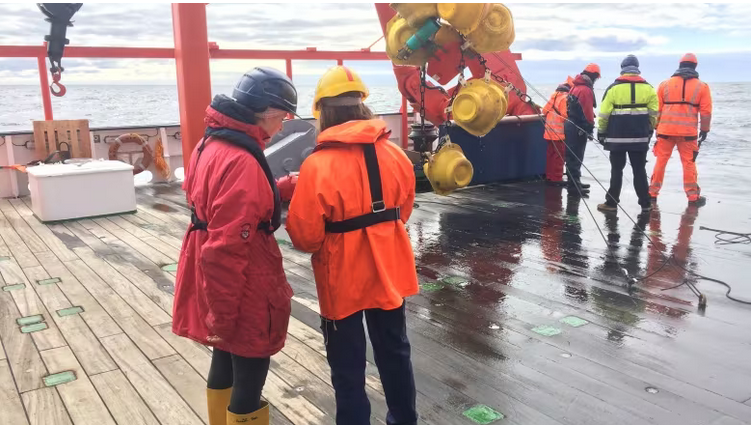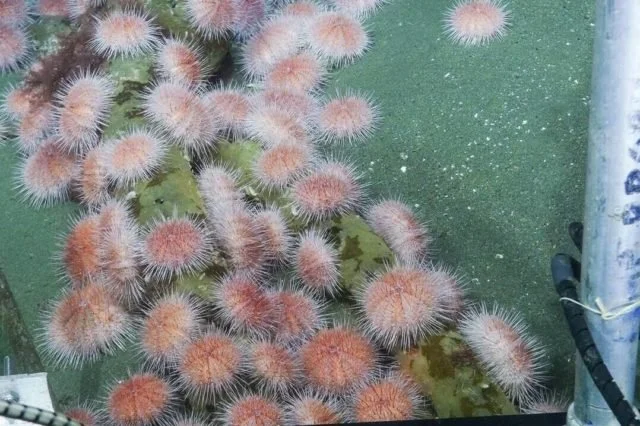Dalhousie University in Halifax will lead what it calls "the most intensive investigation ever into the ocean's role in climate change" thanks to $154-million in federal funding announced Friday. The research program is getting a piece of $1.4 billion awarded to Canadian universities by the federal government through the Canada First Research Excellence Fund.
B.C’s pink sea urchins are on the move to shallower waters thanks to climate change
Pink sea urchins off the coast of Vancouver Island are expanding into shallower waters, in what researchers say is an indication of how rapidly climate change is affecting ocean life. Researchers at Memorial University, Ocean Networks Canada and the University of Victoria found the urchins, living as deep as 400 metres below, were expanding their populations into shallower water at an average rate of 3.5 metres per year as ocean warming reduces oxygen levels and food sources at lower depths.
Here's how to reduce the risk of cancer if you have arsenic in your well water
A Memorial University researcher is urging well owners in Newfoundland to make lifestyle changes to reduce the risk of disease caused by arsenic exposure. Atanu Sarkar, an assistant professor in the Faculty of Medicine, says years or decades of drinking water contaminated by arsenic increases the risk of several cancers — including kidney, liver and lung cancer — due to epigenetic changes that occur during long-term exposure. "They're more prone to have cancer in [the] future," Sarkar said.
Nfld to tax soft drinks
Newfoundland and Labrador has unveiled details of what it says will be the country's first tax on sugary drinks. Government officials said today the tax will hike prices on drinks with added sugars by 20 cents a litre beginning in September 2022. Provincial officials say the tax, expected to raise roughly $9 million a year, will be unique in Canada. Finance Minister Siobhan Coady says the tax is part of the government’s effort to make Newfoundland and Labrador one of Canada's healthiest provinces by 2031.
Disposable face masks lead to more microplastics in waterways: Canadian study
The use of disposable face masks as a result of the COVID-19 pandemic has led to more microplastics in waterways, a recent study from Canadian researchers has found. Microplastics are tiny plastic particles that are less than 5 millimetres long and are created through the degradation of discarded plastic-containing products. These particles have been observed polluting various natural ecosystems, particularly aquatic environments.
‘Take on the impossible’: Shad Memorial takes summer school to a whole other level
As well, all participants are working on a design project. This year’s theme is How Might We Help Canadians Treat Our Fresh Water With More Respect? Ms. Yanikomeroglu says she is already applying what she learned from Dr. Loeffler. “She challenged us to take on the impossible,” she said. “I found this to be especially relevant for our design project. Fuelled with encouraging words and a team of hard-working friends, we did indeed feel equipped to take on the impossible. Shad reminds me that if you can dream it, you can achieve it!”
As construction of new hospital moves ahead, MUN engineer raises flooding concerns
A Memorial University professor says the Newfoundland and Labrador government is taking a big risk by building a mental health and addictions facility in an area that has flooded repeatedly over the past few decades. The location of the new mental health hospital, near the Health Sciences Centre in St. John's on a flood plain, has drawn criticism from many, including Joseph Daraio, a hydraulic engineer and MUN associate professor. "It's not a really good idea to put any building in a flood plain," said Daraio in a recent interview. "Especially something that would include such a high risk to so many people in a flood plain."








